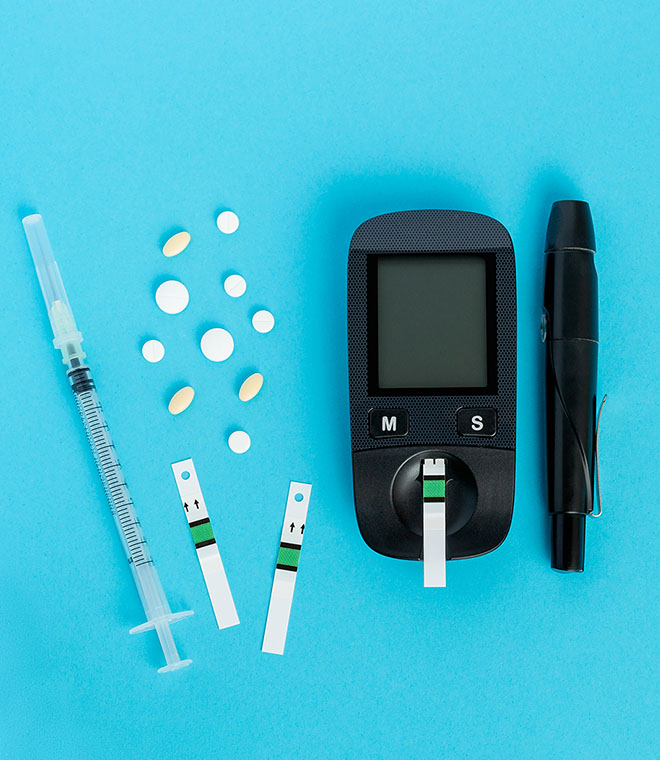Health
Sugar substitutes for diabetes
By Tiffanie Taylor, PharmD Jun 08, 2022 • 7 min
There are many sugar substitutes available for people living with diabetes.
Sugar alcohols, stevia, aspartame, honey, coconut sugar and maple syrup are common sugar substitutes found in some processed foods or drinks and are sold at grocery stores. These are often used in place of table sugar to sweeten and enhance the flavor of food and drinks. But not all sweeteners are created equal when it comes to calories and their impact on blood sugar levels. Here you’ll learn the differences among these popular options.
Sugar alcohols
Substances known as sugar alcohols are a type of sugar found naturally in fruits and vegetables. They are commercially processed and used to sweeten processed foods. Although their name includes "alcohol," they do not contain alcohol. There are many different types of sugar alcohols. It is important to read food ingredient lists to know whether sugar alcohols are used to sweeten a specific food or drink. Common sugar alcohols are:
- Erythritol
- Glycerol (also called glycerin or glycerine)
- Mannitol
- Sorbitol
- Isomalt
- Lactitol
- Maltitol
- Hydrogenated starch hydrolysates
- Xylitol
Sugar alcohols have about one half of the calories than table sugar. Because sugar alcohols are only partly absorbed by the body, their effect on blood sugar is smaller than that of other sugars. Sugar alcohols can cause stomach gas, bloating, and diarrhea when consumed in large amounts. The product label can help you determine the number of grams of sugar alcohols per serving.
Stevia
A natural substance, stevia is made from leaves of the South American stevia plant. Stevia is 200 to 400 times sweeter than natural sugar, yet it does not contain calories or cause an increase in blood sugar. Stevia is approved by the FDA as safe to use in foods and drinks and is often used to sweeten processed foods. This sugar substitute is sold under brand names like Truvia®, SweetLeaf®, and Stevia in the Raw®.
Aspartame
The ingredient aspartame is approved by the FDA as a safe sugar substitute. Both aspartame and sugar contain 4 calories per gram, but aspartame is about 200 times sweeter than sugar. The small amount of aspartame needed to sweeten foods or drinks does not have an effect on your blood sugar. Aspartame is sold under brand names such as Nutrasweet® and Equal®. People with a rare genetic condition called phenylketonuria have problems processing an amino acid found in aspartame called phenylalanine, so they should avoid this sugar substitute.
Honey
Natural honey is a sweet substance made by honey bees. It is often added to foods or drinks as a natural sweetener in place of table sugar. While it is often promoted as a healthier option, there is generally no health advantage for using it as an alternative to sugar in a diabetes meal plan. Honey has slightly more calories than sugar, and both will affect your blood sugar level. However, honey is considered sweeter than sugar, so you might use less of it to sweeten a food or drink.
Coconut sugar
Made from coconuts, coconut sugar is a brown, crystallized substance. This natural sweetener has the same calories as regular sugar and can increase blood sugar levels. As with honey, coconut sugar is still considered an added sugar and should be used sparingly.
Maple syrup
Another natural sweetener, maple syrup, is made from the sap of maple trees. Maple syrup and sugar are comparable in calories. It also has a similar effect on the body as other added sugars and can raise blood sugar levels.
The bottom line
There are many sugar substitutes that can be used to replace table sugar. Some types of sweeteners contain calories and can raise blood sugar levels while others do not. Replacing sugary foods and drinks with a low calorie or no calorie sweetener such as aspartame or stevia, is one way to reduce added sugars in your diet and could lead to better long-term blood sugar control. For some people, using these products can be a good substitute for added sugars when used in moderation, but it really comes down to personal choice. If you have questions about sugar substitutes, talk to a member of your diabetes care team.
Clinically reviewed and updated by Amy Magill, MA, RDN, June 2022.
Sources:
1. care.diabetesjournals.org/content/43/Supplement_1/S48.
2. https://doi.org/10.1038/sj.bdj.2017.1011.
8. https://medlineplus.gov/ency/article/002444.htm
11. https://familydoctor.org/sugar-substitutes/
12. https://www.diabetes.org/healthy-living/recipes-nutrition/understanding-carbs/get-to-know-carbs
13. https://www.uptodate.com/contents/type-2-diabetes-and-diet-beyond-the-basics



